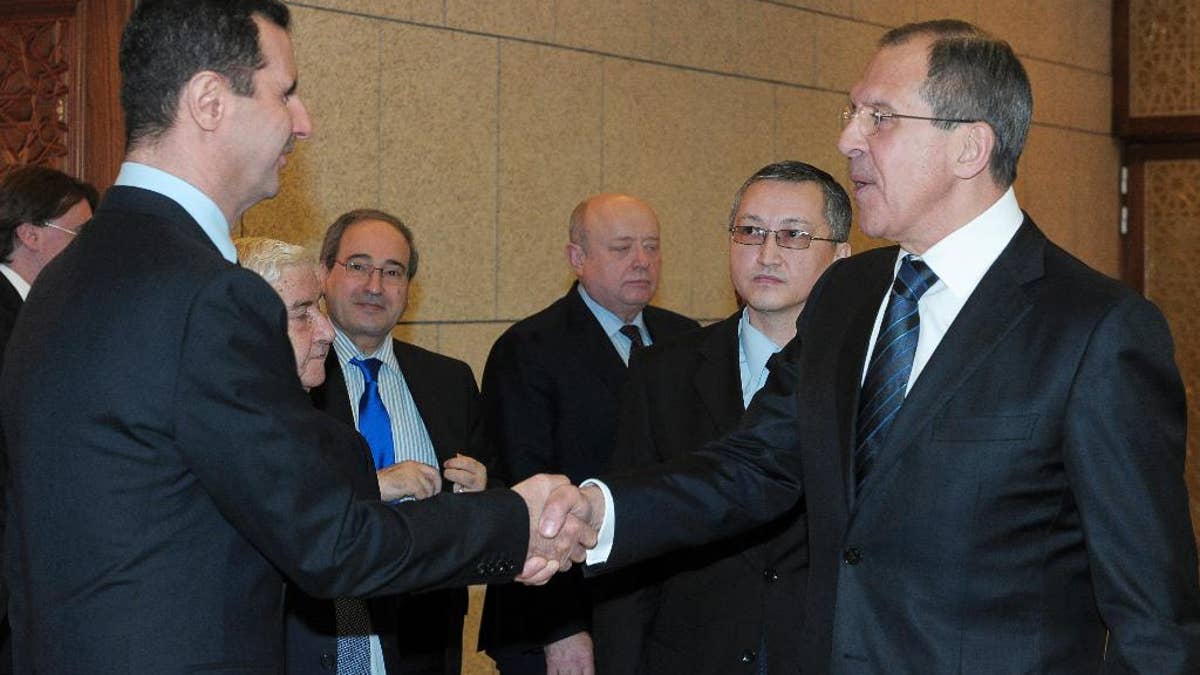
FILE - In this Feb. 7, 2012 file photo, Syrian President Bashar Assad, left, shakes hands with Russian Foreign Minister Sergey Lavrov after talks in Damascus, Syria. Lavrov said Thursday, Sept. 10, 2015, that Russian aircraft flying into Syria have been delivering weapons along with humanitarian supplies. (AP Photo/Pool, File) (The Associated Press)
CAIRO – Russia's deployment of military advisers and troops to Syria to back President Bashar Assad in the country's civil war is a rare direct intervention by Moscow in the Middle East, a sign of how vital its alliance with Damascus is for it in the region.
During the Cold War, the Soviet Union competed with the West for influence in the region, but largely found itself squeezed out by Washington's powerful alliances with Israel, Egypt, Saudi Arabia and the Gulf and, until 1979, Iran. That has long made Syria its main doorway into the Arab world. Since the USSR's dissolution in 1991, Russia has largely sought influence through arms deals, particularly with countries whose ties with the United States were strained.
Here's a look at some of the ties Russia and its predecessor the Soviet Union built around the region.
SYRIA
Moscow's alliance with Damascus dates back to 1955, when the Soviet Union struck its first deal to provide arms to Syria, and since then it has been Syria's main military suppliers, to the tune of hundreds of millions of dollars over the decades. Moscow helped rebuild Syria's military after its disastrous wars with Israel in 1967 and 1973. Syria is home to Russia's only naval facility in the Mediterranean, a base at Tartous. Since the Syrian civil war erupted in 2011, Russia has been a chief backer of Assad, fending off U.N. resolutions against him and stepping up arms deliveries to his military.
EGYPT
In the 1950s and 1960s, Egypt's President Gamal Abdel Nasser was the most important ally for Moscow in the region. The Soviets helped fund his construction of the Aswan High Dam and built up his military, backing him in the 1967 war with Israel. But in 1972, Nasser's successor Anwar Sadat broke the military alliance with Moscow, throwing out Soviet advisers ahead of his 1973 war with Israel. Since then, especially after Sadat reached a peace deal with Israel, Egypt moved solidly into the American camp, with Washington providing it billions in aid, particularly to its military. Still, amid frictions with Washington the past two years, President Abel-Fattah el-Sissi has flirted with new arms deals with Moscow.
IRAN
Russia has given Iran's government key political backing at the United Nations amid the dispute with the West over its nuclear program, as well as helping it build its Bushehr reactor. Moscow is also a key arms provider for Tehran, most recently promising to deliver a long-delayed S-300 air defense system later this year.
PALESTINIANS
In the 1970s, the Soviet Union was a provider of some arms to the Palestine Liberation Organization under Yasser Arafat, giving Moscow influence not only in the Israeli-Palestinian conflict but also in Lebanon's 1975-1990 civil war. But with the fall of the Soviet Union and the peace process with Israel, the Palestinian Authority moved to a reliance on U.S. and European support.
YEMEN
The Soviet Union had a brief direct role in a civil war in what was then North Yemen in the 1960s, when its warplanes carried out strikes backing republican forces in fighting against royalists. But Moscow had a major ally and a foothold in the Gulf region in South Yemen, which had a Marxist-leaning government after it become independent from a British colonial protectorate in 1967. The Soviets were the main arms supplier to south, and in returned they received use of its strategic air and naval bases on the Arabian Sea. But Moscow's support dropped off dramatically in the Soviet Union's final years, and in 1990, north and south Yemen reunified. Since then, the frequently unstable governments in Sanaa have largely leaned toward the United States and its ally Saudi Arabia.
AFGHANISTAN
Though Afghanistan is technically outside the Middle East, the 1979 Soviet invasion of the country had major repercussions for it across the region. Saudi Arabia and other Gulf countries joined the U.S.-backed effort to support Afghanistan's Islamic mujahedeen movement, which eventually forced the Soviets to withdraw in 1989.
